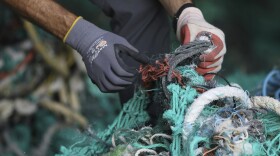State agriculture officials are assessing measures to prevent the spread of the avocado lace bug, one of the latest invasive species spreading in the islands.
The insects were found in Pearl City in December. The Department of Agriculture, with help from the University of Hawai?i's College of Tropical Agriculture and Human Resources, later identified the bugs on the Big Island and in plants at retail outlets on Maui. The plants were either treated or destroyed.
"The lace bugs sucks the juices out of the leaves [of avocado plants], and it will cause a yellowing of the leaves," said Darcy Oishi, biological control section chief at the agriculture department.

"This can decrease the vigor of the plant in the long-term. There won't necessarily be death of the plant, but it will make it more susceptible to attack by other insects and diseases."
Agriculture officials say that because the lace bugs feed on the leaves, they may cause leaves to become dry and drop prematurely. An infestation may also result reduce avocado fruit yields.
Officials don't know how the lace bug was introduced to the islands, but they believe it is already established on O?ahu.
"Eradication is probably out of the question for O?ahu," Oishi said. "We have a number of confirmed sightings of the insect on O?ahu at this time. We have not found any lace bugs on plants in the wild on the neighbor islands."
The new bug could affect avocado farms on Hawai?i Island, Maui, and O?ahu, but Oishi says it is not a "paradigm-changing pest." He said farms in California and Florida have not had to change how their avocado businesses operate.
"It's not something that will require, in the long-term, progressively higher investments of money," he said. "Like coffee bearer borer, for instance, really changed how we deal with coffee and grow coffee."
Oishi said he's worried about how the bug got into the state and what other pests could have entered with it -- "because lace bugs need a living plant in order to survive."
More information about the avocado lace bug, and its impact on avocado plants, can be found on the Department of Agriculture's website.
If you believe your plants have an infestation, Oishi suggests taking a clear, in-focus picture of the affected leaf, or bugs, and email it to hdoa.ppc@hawaii.gov.
The department is investigating treatment plans to eradicate the bug at different levels of infestation.
The University of Florida has identified citrus oil and the insecticidal soap M-Pede for short-term lace bug control, according to the University of California, Riverside. Insecticides approved for avocado plants also control the pest, the University of Florida advised.




